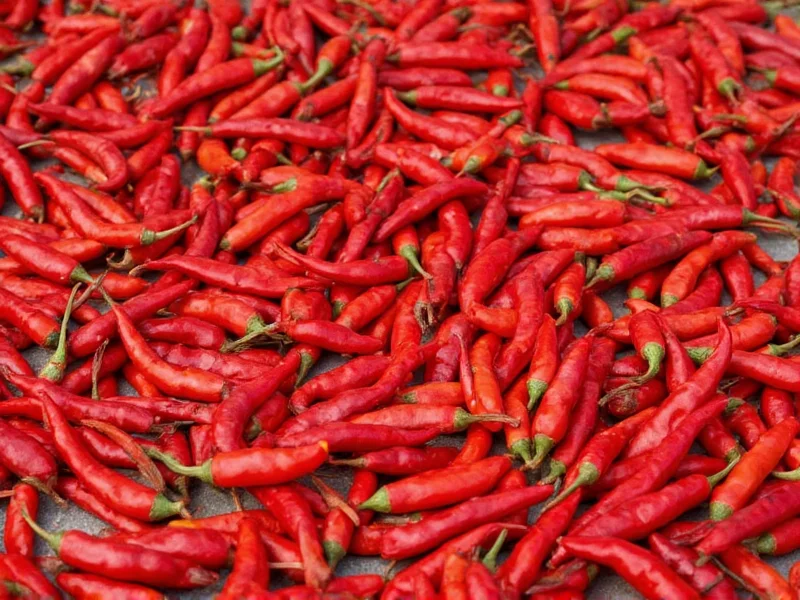Drying red chilli peppers preserves their intense heat and flavor while extending shelf life significantly. Whether you've harvested your own garden peppers or bought a surplus at market, proper drying transforms fresh chillies into versatile pantry staples for cooking, grinding into powder, or creating infused oils. This guide covers four reliable methods with professional tips to achieve perfect results every time.
Preparing Peppers for Drying
Start with fully mature red chillies that show vibrant color and firm texture. Avoid peppers with soft spots, mold, or significant blemishes as these won't dry properly. Common varieties like cayenne, serrano, or Thai bird's eye peppers work exceptionally well for drying.
Carefully wash peppers under cool running water, then pat completely dry with clean towels. For most drying methods, leave stems intact but remove any leafy material. Some prefer to slice peppers lengthwise to speed drying, though this may affect final texture. Remember that thinner-walled varieties dry faster than thick-walled habaneros or bell peppers.
Comparing Drying Methods
| Method | Time Required | Effort Level | Best For | Key Advantage |
|---|---|---|---|---|
| Sun Drying | 5-10 days | Low | Dry climates | Natural flavor development |
| Oven Drying | 6-12 hours | Medium | Quick results | Controlled environment |
| Food Dehydrator | 8-15 hours | Low | Consistent results | Precise temperature control |
| Air Drying (Stringing) | 2-4 weeks | Medium | Decorative purposes | Traditional method |
Step-by-Step Drying Instructions
Sun Drying Method
This traditional approach works best in hot, dry climates with low humidity. Place peppers in a single layer on clean mesh trays, ensuring good air circulation. Cover with fine cheesecloth to protect from insects while allowing airflow. Rotate trays periodically for even drying. Bring trays indoors at night to prevent moisture absorption. The process typically takes 5-10 days depending on conditions. Peppers are done when they snap easily rather than bend.
Oven Drying Technique
Preheat your oven to its lowest setting (ideally 140°F/60°C). Arrange peppers on wire racks placed over baking sheets to allow air circulation. Leave the oven door slightly ajar using a wooden spoon to maintain proper airflow. Check every 2 hours, rotating trays for even drying. Total drying time ranges from 6-12 hours depending on pepper thickness. This method requires monitoring to prevent scorching.
Food Dehydrator Process
Set your dehydrator to 135°F (57°C). Arrange peppers in a single layer on trays without overlapping. For faster drying, cut larger peppers in half lengthwise. Check after 8 hours, rotating trays if needed. Most peppers dry completely in 8-15 hours. The dehydrator's consistent airflow and temperature control make this the most reliable method for beginners learning how to dry red chilli peppers at home.
Air Drying by Stringing
Thread a needle with strong cotton string and carefully pierce through the stem end of each pepper. Create a ristra (traditional pepper string) by threading 10-15 peppers. Hang in a warm, dry, well-ventilated area away from direct sunlight. This decorative method takes 2-4 weeks but preserves peppers beautifully. Ensure good air circulation around the entire string for even drying.
Proper Storage of Dried Chillies
Before storage, verify complete dryness by snapping a pepper in half—it should break cleanly without bending. Store dried chillies in airtight glass jars or vacuum-sealed bags. For best results, include a food-safe desiccant packet to absorb any residual moisture. Keep containers in a cool, dark cupboard away from heat sources. Properly stored dried chillies maintain optimal flavor for 1-2 years.
Check stored peppers monthly for any signs of moisture or mold. If you notice condensation inside containers, return peppers to the dehydrator for additional drying time. Never store dried chillies in plastic bags long-term as they can trap moisture.
Troubleshooting Common Drying Issues
Mold development: Usually indicates insufficient airflow or high humidity. Increase ventilation and consider adding a fan for air drying methods. For oven or dehydrator methods, slightly increase temperature.
Inconsistent drying: Rotate trays regularly and ensure peppers aren't touching. Slice larger peppers uniformly for more consistent results when learning how long to dry red chilli peppers in oven settings.
Loss of vibrant color: Exposure to direct sunlight during drying can fade color. Use indirect light for sun drying or ensure proper oven/dehydrator temperatures don't exceed recommended levels.
Creative Uses for Dried Chillies
Transform your dried peppers into versatile kitchen ingredients. Crumble whole dried chillies directly into stews and soups for controlled heat. For consistent results when making chili powder from dried peppers, pulse in a spice grinder until fine, then sift to remove seeds and stems.
Create infused oils by steeping dried chillies in high-quality olive oil for 2-3 weeks. Make traditional Mexican arbol sauce by rehydrating dried peppers in hot water, then blending with garlic and vinegar. Dried chillies also make thoughtful homemade gifts when presented in decorative jars with usage instructions.











 浙公网安备
33010002000092号
浙公网安备
33010002000092号 浙B2-20120091-4
浙B2-20120091-4